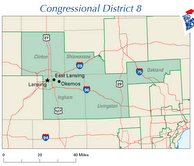My kids are fairly skeptical bunch -- but they come by it honestly. When they were younger, they'd complain about books and movies that had totally silly plot lines or situations. That's when we sat down and talked about the concept of "willing suspension of disbelief."
Coined by the poet Samuel Coleridge, this is a device used in fiction (particularly in theater and film) which allows the author to get his or her point across without bowing to the constraints of reality.
Wikipedia has a pretty concise description of why this works:
According to the theory, suspension of disbelief is a quid pro quo: the audience tacitly agrees to provisionally suspend their judgment in exchange for the promise of entertainment.
I thought about willing suspension of disbelief recently when a retired friend forwarded me a letter from Mike Rogers. In it, he described his latest reason for opposing SCHIP: "...[it] could cut the Medicare program by $190 billion if it becomes law."
Oh, please. Apparently, the bogeymen of illegal immigrants and wealthy families free-riding on taxpayers wasn't scary enough. Mr. Rogers decided to expand his apocalyptic vision of the future to include senior citizens losing funding for home oxygen as SCHIP threatened the Medicare Advantage program.
(Hey, kids -- don't provisionally suspend your judgement just yet! )
Here's a little background on the supposedly endangered Medicare Advantage (MA). MA is the program through which private insurance plans participate in Medicare. It offers some benefits that traditional Medicare doesn't, like dental coverage. It may also offer rebates and discounts to enrollees. MA has grown rapidly since it began in 2003. As of June 2007, it covered about 18% of Medicare beneficiaries. There are three types of MA programs: HMO (health maintenace organization), PPO (preferred provider organization) and PFFS (private fee for service). PFFS programs became an MA option in 2006.
Now, Republicans like Mike Rogers will tell you that competition is good. So is choice, and so is efficiency. They believe that private insurers do a much more efficient job of providing health benefits to retirees than the nasty, bloated federal monster that is Medicare Part A & B.
Except that they don't.According to the
Congressional Budget Office, these private Medicare Advantage plans cost an average of 12 percent more than traditional Medicare. For PFFS plans, the cost is 19% higher. In
Congressional testimony this summer, the Medicare Payment Advisory Commission (an independent federal body) noted that
The excess payments to private plans allow them to be less efficient than they would
otherwise have to be, because inefficient plans can use the excess payments—rather than savings from efficiencies—to finance extra benefits that in turn attract enrollees to such plans.
Unfortunately, MA has instead become a program in which there are few incentives for efficiency. Although MA uses "bidding" as the means of determining plan payments and beneficiary premiums, the bids are against administratively-set
benchmarks.
Put differently, inefficient plans—as well as efficient plans—are able to provide the kind of enhanced coverage that attracts beneficiaries to private plans because of generous MA program payments. These additional payments are funded by all taxpayers. Furthermore, all Medicare beneficiaries—not just the 18 percent of beneficiaries enrolled in private plans—pay higher Part B premiums to fund these payments in excess of Medicare FFS levels.(emphasis mine)
A recent
CBO briefing paper estimates that between 2007 and 2017, spending on MA will total $1.5 trillion -- more than 25% of all spending for benefits under traditional Medicare.
The Century Foundation, a nonprofit public policy research group, has an informative -- and readable --
paper on the economics of Medicare Advantage. Included in its analysis are some useful industry numbers. For example, the 2007 second quarter profits at UnitedHealth were up 22%, Aetna saw 16% jump and Wellpoint 11% in the same period. Pretty impressive, you'd think, until you read this:
This is not to say that Wall Street broke out the champagne. In recent years, investors have come to count on rich returns from insurers, and many sniff at numbers like 11 percent. To give you an idea of what investors expect, consider the fact that Humana’s stock has climbed 26 percent in the past seven months. Over five years, UnitedHealth Group’s shares have gained 125 percent, while WellPoint’s investors have reaped a 130 percent return.
How is this possible, given that growing numbers of employers are reducing health insurance benefits or dropping them altogether?
Bloomberg explains: "UnitedHealth’s profits rose 22 percent on gains from govern-ment -sponsored medical programs." Here Bloomberg is referring to what it describes as "the boon UnitedHealth has seen from increasing the profitability of its Medicare programs for the elderly and adding 290,000 members in state Medicaid programs for the poor in the 12 months through June 30."
Aetna also got a boost from the government; in the second quarter, it raked in Medicare premiums of $677.8 million, up from $436 million a year earlier. WellPoint President Angela Braly echoes the theme, announcing that her company’s profits were driven by "expanded enrollment in government-funded programs" [skip] In fact, "Humana derives more than 50 percent of its 2007 earnings from Medicare Advantage alone," Justin Lake, an analyst with UBS Investment Research, recently pointed out to his clients. The company is forecasting Medicare profits margins of 5 percent for 2007—up from 4 to 5 percent in earlier statements. [skip]
To put it bluntly, at a time when some customers are deserting private insurers (because they find premiums too high), the government is subsidizing the industry. But is this Medicare’s job? Are we to view UnitedHealth as another Chrysler? Are the taxpayers who fund Medicare responsible for making sure that UnitedHealth’s shareholders continue to make 125 percent on their investment every five years?
Good question.
Now, back to the willing suspension of disbelief. Mike Rogers wants you to believe that funding for children's health care coverage would have seriously threatened seniors' health care coverage.
Well, Mr. Rogers, I'm not suspending my judgement -- and I'm not at all entertained by a politician who uses scare tactics to protect subsidies for a billion-dollar industry.
Especially when that politician received nearly one-third of his 2006 total PAC contributions from the health & insurance industries...






